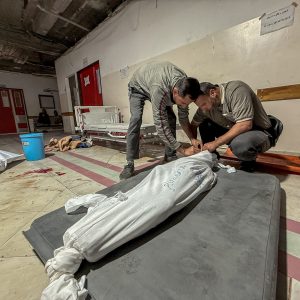Deepening divide: Erosion of Muslim rights in India’s political landscape
Renowned journalist Ziya Us Salam’s book is not only a critique, but also call to action for empathy and inclusivity at a time when India is at a critical crossroads of identity and governance
By Iftikhar Gilani
In the turbulent turmoil of India’s election campaign, Prime Minister Narendra Modi has himself stepped up divisive rhetoric and shone a harsh light on the country’s fraying secular fabric.
Modi’s speeches, laced with inflammatory remarks about the Muslim minority, have marked a worrying turning point in the country’s political discourse. Calling Muslims “invaders” and accusing them of having large families to outnumber Hindus, Modi’s words embolden Hindu nationalist tropes to threaten the delicate balance of India’s pluralistic society.
The gravity of this rhetoric cannot be underestimated in a country where cultural diversity has been a celebrated pillar for centuries. However, the experiences described by renowned journalist Ziya Us Salam in his book “Being Muslim in Hindu India: A Critical View” suggest that the shadows of discrimination have always been there and are now even more evident under the current government.
Through compelling narratives, Salam explores the socio-political landscape that has systematically marginalized Muslims and offers a critical examination of their shrinking voice in the public and political space.
One particularly harrowing incident recounted in the book concerns Deepak Bandhila, a former journalist who was mistaken for a Muslim because of his beard and subjected to brutal police violence in Madhya Pradesh.
In March 2020, when the shadows of the coronavirus pandemic were beginning to emerge and the wearing of masks was not yet considered necessary, Bandhila, a resident of the town of Betul in the central Indian state of Madhya Pradesh, was on his way to the local hospital early in the morning to pick up diabetes medication.
Because of his beard, Bandhila could have been mistaken for a Muslim. At a crossroads in the city, he was stopped by police officers and severely beaten up.
When Bandhila complained to senior officers and then filed a complaint in court, the police officers queued up at his home, apologized, and asked him to withdraw his complaint.
The police officers repeatedly tried to explain that they were mistaken because of his long beard, which is commonly associated with Muslims and thought they were beating a Muslim. They also mentioned that Kapil Savarshtri, the police officer who mercilessly beat his body with batons, inexplicably gets an itch in his palm at the sight of Muslims and finds it pleasant to beat them.
Bandhila wonders, if a Hindu who is mistaken for a Muslim is treated like this, what must happen to actual Muslims? This incident forces us to reflect on the plight of the actual Muslim community when those who are merely perceived as members are treated like this.
The 174-page book is full of such incidents. It takes an in-depth look at the mechanisms of suffrage and cultural disenfranchisement that have intensified since the rise of Hindu nationalism.
In Indian elections, Hindu nationalists usually use three issues to appeal to Hindu voters: Cows, Pakistan, and Muslims. The cow theme was used in the 2014 elections, and in the 2019 elections, the nation was mobilized with themes around Pakistan to win votes. It now appears that Muslims are the direct target for the 2024 elections.
Muslim representation in legislative bodies is declining, which is a worrying trend for Indian democracy, which thrives on inclusivity. Moreover, Modi’s actions, such as the inauguration of the Ram temple at the controversial site of the demolished Babri Masjid and other measures aimed at consolidating Hindus, indicate a strategic marginalization of Muslims.
Ziya Us Salam has divided his book into eight sections to discuss thirty different issues in detail. The first chapter deals with the political insignificance of Muslims. The book reveals that an estimated 120 million names are missing from the electoral rolls, most of whom are Muslims. Outlook magazine reported that nine thousand Muslim voters were declared dead in the southern state of Karnataka.
-Changing cultural narrative
The author also points to a disturbing shift in the cultural narrative of India. From the renaming of cities with significant Muslim heritage to the portrayal of Muslims as historical villains in contemporary cinema, there are concerted efforts to erase and rewrite the Muslim contribution to India’s rich history.
Films produced after 2014 such as “Samrat Prithviraj” distort historical events to align them with Hindu nationalist sentiments, fostering a climate of alienation.
During the era of Jawaharlal Nehru, when secularism was on the rise, filmmakers produced masterpieces like Naya Daur, Mother India, Anarkali, and Mughal-e-Azam. But after 2014, filmmakers started producing films promoting Hindutva and portraying Muslims as villains to please the rulers.
Many directors are happy to support the government’s policy as they feel that the relationship is mutually beneficial. History is being distorted to such an extent that it is frightening to watch these movies.
For example, in the movie Samrat Prithviraj, it is claimed that Prithviraj killed Muhammad Ghori, although Ghori lived till 1206 and Prithviraj died in 1192. These films ignore the fact that these kings had Hindu ministers and generals.
The Mughal emperor Aurangzeb, who was often targeted, granted land to temples and employed more non-Muslims than his predecessors.
The thousand-year Muslim era is portrayed as a dark age, with even the prime minister at the helm.
By renaming towns and villages, this history is erased and Muslims are alienated. Allahabad was renamed Prayagraj, Mughal Sarai was renamed Deen Dayal Upadhyaya and Faizabad was renamed Ayodhya, among others.
There are plans to rename Agra as Agravan and Bareilly as Maharishi Valmiki Nagar. It is an irony of fate that the Sultan Tipu Express, named after Sultan Tipu who fought against the British, has been renamed the Wodeyar Express in honor of a king who betrayed his people to the British.
Author Ziya Us Salam says these are not isolated incidents but part of a deliberate plan to create the impression that non-Hindus are outsiders who have harmed the country and are hateful. If Muslim rulers have committed excesses, how can it be justified to target the entire Muslim community in the 21st century?
The implementation of what Salam calls “bulldozer justice” is an example of an aggressive attitude of the state towards Muslims. Cases of homes and businesses of Muslims being vandalized under dubious legal pretexts or incited to communal violence during religious processions are alarmingly increasing.
Such actions not only create a state of fear but also suppress the spirit of a community through physical and psychological domination.
-Fight for justice
Despite these darkening clouds, Salam’s narrative finds a silver lining in the resilience and spirit of the Muslim community. His poignant account of communal solidarity during past crises contrasts sharply with the isolation felt during the recent communal riots and paints a bleak picture of social change. Yet it is in this resilience and continued fight for justice and inclusion that Salam sees a beacon of hope for India.
The book covers various topics such as love jihad, mob violence, attacks on mosques, the hijab issue, and Hindutva.
In the course of reading “Being Muslim in Hindu India”, a poignant story emerges— – a story of struggle, resilience, and the constant quest for justice. Through Salam’s penetrating gaze, readers are invited to confront uncomfortable truths and embark on a journey toward empathy and understanding. In a nation at a crossroads of identity, this book serves as a beacon of hope, pointing the way to a more inclusive and compassionate future.
Reading the book can lead to despair, but the author suggests that these situations may herald the dawn of a new day. The world thrives on hope.
The book is not just a critique but a call to action for empathy and inclusivity at a time when India is at a critical crossroads of identity and governance.
As the nation grapples with these challenges, Salam’s insights challenge readers to look beyond preconceptions and strive for a future built on the fundamental values of justice and equality. Only by understanding and grappling with these uncomfortable truths can India find its way to a more inclusive and compassionate future.












